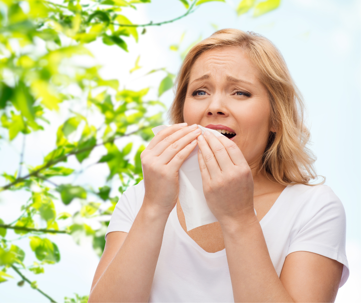Nipping Spring Allergies in the Bud
Spring has arrived! However, rebirth and renewal aren’t the only things in the air. During the spring, all kinds of trees, weeds, plants, and grasses release small grains of pollen into the air to fertilize other plants. Because the pollen is small and light, it travels through the wind and frequently causes allergic reactions.
Symptoms of seasonal allergies include congestion, sneezing, coughing, a runny nose, an itchy throat, watering eyes, and irritation in the roof of your mouth. If you’re prone to experiencing allergies all spring long, here are some useful tips to keep them at bay.
Reduce your exposure.
During spring months, keep the windows in your home and car closed. On particularly windy or dry days, avoid spending time outdoors, and do not hang your clean laundry outside to dry. After you have been outdoors, remove your clothing and wash your hair and skin to remove any traces of pollen. Do not cut the grass, pull weeds, or do any gardening.
Remove pollen from indoor air.
It’s inevitable that pollen will get inside your home and vehicle. To combat this, utilize your air conditioning or invest in a certified allergy air filter! A dehumidifier and/or an air purifier will help to lower the pollen spore count in the air.
Change your vehicle's air filters.
Don’t forget your vehicle! Keep your air filters clean and change them out on a regular basis. Your car’s cabin air filter is designed to supply fresh air to passengers inside the car when the windows are closed. A clean cabin air filter works to prevent dust, pollen, and other allergens from entering the car. A dirty, clogged filter is unable to work efficiently, and may fail to provide optimal protection against these allergens.
Rinse out your sinuses.
When pollen overwhelms your sinus passages, one of the best things to do is to rinse out your airways. A sinus flush with a saline solution is one of the easiest and most effective ways to eliminate the pollen that irritates your respiratory system.
Take over-the-counter medications.
After checking with your doctor or health care provider, choose an over-the-counter medication that is right for your symptoms. Medications like oral antihistamines, oral decongestants, and corticosteroid nasal sprays are all beneficial in reducing the effects of seasonal allergies.

